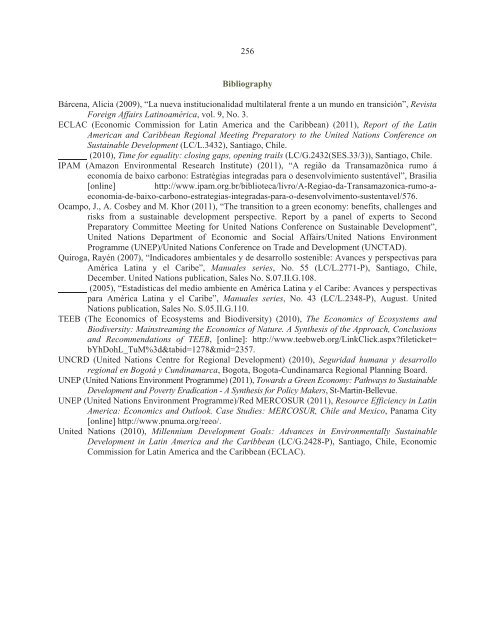sustainable development 20 years on from the ... - José Eli da Veiga
sustainable development 20 years on from the ... - José Eli da Veiga sustainable development 20 years on from the ... - José Eli da Veiga
255 initiatives, are intended to nourish these visions. Yet the challenge of
256 Bibliography Bárcena, Alicia (
- Page 205 and 206: 204 Regions Table
- Page 207 and 208: 206 In addition to
- Page 209 and 210: 208 Figure V.5 LAT
- Page 211 and 212: 210 Innovative financing mechanisms
- Page 213 and 214: 212 8.8 Agricultural support estima
- Page 215 and 216: 214 2. Agricultural subsidies Most
- Page 217 and 218: 216 (18.9%). 11 Fishery subsidies h
- Page 219 and 220: 218 Figure V.9 LATIN AMERICA AND TH
- Page 221 and 222: 220 1. Science and
- Page 223 and 224: 222 Figure V.10 LATIN AMERICA AND T
- Page 225 and 226: 224 2. Scientific capacities and te
- Page 227 and 228: 226 4. Knowledge plurality Rural po
- Page 229 and 230: 228 IDB (Inter-American Development
- Page 232 and 233: 231 Chapter VI GUIDELINES FOR ACHIE
- Page 234 and 235: 233 B. GUIDELINES FOR THE INTEGRATI
- Page 236 and 237: 235 (b) Strengthen policies designe
- Page 238 and 239: 237 from these sectors could suffer
- Page 240 and 241: 239 (f) Send proper signals to esse
- Page 242 and 243: 241 The following actions are sugge
- Page 244 and 245: 243 As part of the preparatory proc
- Page 246 and 247: 245 Indicators can help to raise aw
- Page 248 and 249: 247 All of these initiatives seek t
- Page 250 and 251: 249 (a) Reform curricula to include
- Page 252 and 253: 251 (ii) Support initiatives to for
- Page 254 and 255: 253 (b) For Latin America and the C
- Page 258: This report describes the progress
256<br />
Bibliography<br />
Bárcena, Alicia (<str<strong>on</strong>g>20</str<strong>on</strong>g>09), “La nueva instituci<strong>on</strong>ali<strong>da</strong>d multilateral frente a un mundo en transición”, Revista<br />
Foreign Affairs Latinoamérica, vol. 9, No. 3.<br />
ECLAC (Ec<strong>on</strong>omic Commissi<strong>on</strong> for Latin America and <strong>the</strong> Caribbean) (<str<strong>on</strong>g>20</str<strong>on</strong>g>11), Report of <strong>the</strong> Latin<br />
American and Caribbean Regi<strong>on</strong>al Meeting Preparatory to <strong>the</strong> United Nati<strong>on</strong>s C<strong>on</strong>ference <strong>on</strong><br />
Sustainable Development (LC/L.3432), Santiago, Chile.<br />
(<str<strong>on</strong>g>20</str<strong>on</strong>g>10), Time for equality: closing gaps, opening trails (LC/G.2432(SES.33/3)), Santiago, Chile.<br />
IPAM (Amaz<strong>on</strong> Envir<strong>on</strong>mental Research Institute) (<str<strong>on</strong>g>20</str<strong>on</strong>g>11), “A região <strong>da</strong> Transamazõnica rumo á<br />
ec<strong>on</strong>omía de baixo carb<strong>on</strong>o: Estratégias integra<strong>da</strong>s para o desenvolvimiento sustentável”, Brasilia<br />
[<strong>on</strong>line] http://www.ipam.org.br/biblioteca/livro/A-Regiao-<strong>da</strong>-Transamaz<strong>on</strong>ica-rumo-aec<strong>on</strong>omia-de-baixo-carb<strong>on</strong>o-estrategias-integra<strong>da</strong>s-para-o-desenvolvimento-sustentavel/576.<br />
Ocampo, J., A. Cosbey and M. Khor (<str<strong>on</strong>g>20</str<strong>on</strong>g>11), “The transiti<strong>on</strong> to a green ec<strong>on</strong>omy: benefits, challenges and<br />
risks <strong>from</strong> a <str<strong>on</strong>g>sustainable</str<strong>on</strong>g> <str<strong>on</strong>g>development</str<strong>on</strong>g> perspective. Report by a panel of experts to Sec<strong>on</strong>d<br />
Preparatory Committee Meeting for United Nati<strong>on</strong>s C<strong>on</strong>ference <strong>on</strong> Sustainable Development”,<br />
United Nati<strong>on</strong>s Department of Ec<strong>on</strong>omic and Social Affairs/United Nati<strong>on</strong>s Envir<strong>on</strong>ment<br />
Programme (UNEP)/United Nati<strong>on</strong>s C<strong>on</strong>ference <strong>on</strong> Trade and Development (UNCTAD).<br />
Quiroga, Rayén (<str<strong>on</strong>g>20</str<strong>on</strong>g>07), “Indicadores ambientales y de desarrollo sostenible: Avances y perspectivas para<br />
América Latina y el Caribe”, Manuales series, No. 55 (LC/L.2771-P), Santiago, Chile,<br />
December. United Nati<strong>on</strong>s publicati<strong>on</strong>, Sales No. S.07.II.G.108.<br />
(<str<strong>on</strong>g>20</str<strong>on</strong>g>05), “Estadísticas del medio ambiente en América Latina y el Caribe: Avances y perspectivas<br />
para América Latina y el Caribe”, Manuales series, No. 43 (LC/L.2348-P), August. United<br />
Nati<strong>on</strong>s publicati<strong>on</strong>, Sales No. S.05.II.G.110.<br />
TEEB (The Ec<strong>on</strong>omics of Ecosystems and Biodiversity) (<str<strong>on</strong>g>20</str<strong>on</strong>g>10), The Ec<strong>on</strong>omics of Ecosystems and<br />
Biodiversity: Mainstreaming <strong>the</strong> Ec<strong>on</strong>omics of Nature. A Syn<strong>the</strong>sis of <strong>the</strong> Approach, C<strong>on</strong>clusi<strong>on</strong>s<br />
and Recommen<strong>da</strong>ti<strong>on</strong>s of TEEB, [<strong>on</strong>line]: http://www.teebweb.org/LinkClick.aspx?fileticket=<br />
bYhDohL_TuM%3d&tabid=1278&mid=2357.<br />
UNCRD (United Nati<strong>on</strong>s Centre for Regi<strong>on</strong>al Development) (<str<strong>on</strong>g>20</str<strong>on</strong>g>10), Seguri<strong>da</strong>d humana y desarrollo<br />
regi<strong>on</strong>al en Bogotá y Cundinamarca, Bogota, Bogota-Cundinamarca Regi<strong>on</strong>al Planning Board.<br />
UNEP (United Nati<strong>on</strong>s Envir<strong>on</strong>ment Programme) (<str<strong>on</strong>g>20</str<strong>on</strong>g>11), Towards a Green Ec<strong>on</strong>omy: Pathways to Sustainable<br />
Development and Poverty Eradicati<strong>on</strong> - A Syn<strong>the</strong>sis for Policy Makers, St-Martin-Bellevue.<br />
UNEP (United Nati<strong>on</strong>s Envir<strong>on</strong>ment Programme)/Red MERCOSUR (<str<strong>on</strong>g>20</str<strong>on</strong>g>11), Resource Efficiency in Latin<br />
America: Ec<strong>on</strong>omics and Outlook. Case Studies: MERCOSUR, Chile and Mexico, Panama City<br />
[<strong>on</strong>line] http://www.pnuma.org/reeo/.<br />
United Nati<strong>on</strong>s (<str<strong>on</strong>g>20</str<strong>on</strong>g>10), Millennium Development Goals: Advances in Envir<strong>on</strong>mentally Sustainable<br />
Development in Latin America and <strong>the</strong> Caribbean (LC/G.2428-P), Santiago, Chile, Ec<strong>on</strong>omic<br />
Commissi<strong>on</strong> for Latin America and <strong>the</strong> Caribbean (ECLAC).



